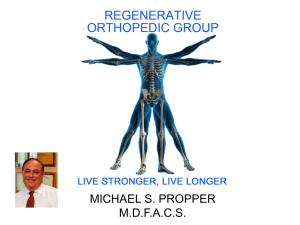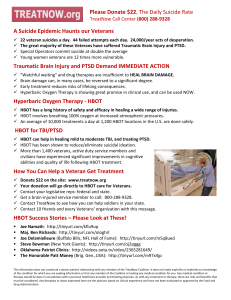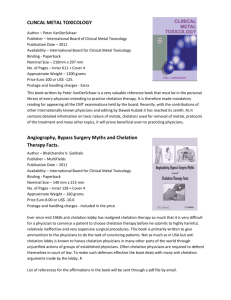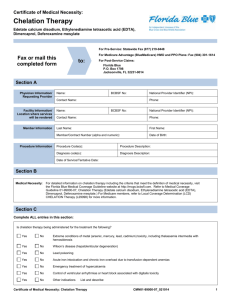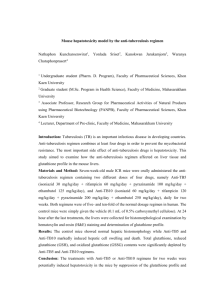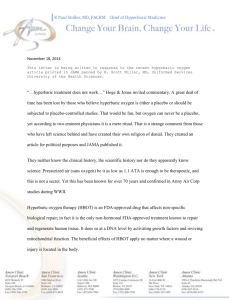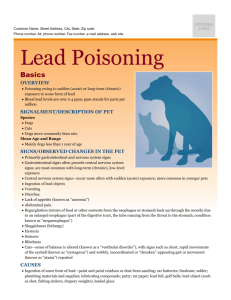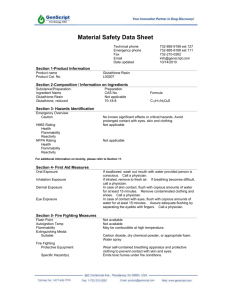vitamin B 12
advertisement
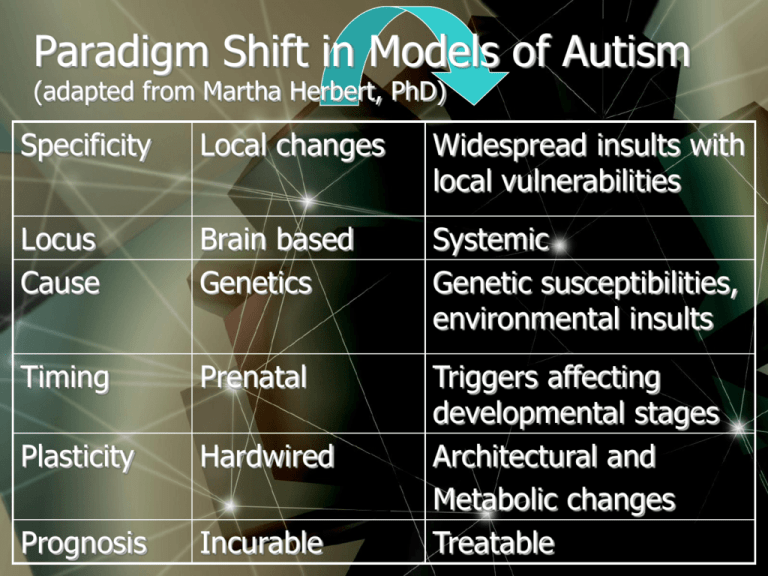
Paradigm Shift in Models of Autism (adapted from Martha Herbert, PhD) Specificity Local changes Widespread insults with local vulnerabilities Locus Cause Brain based Genetics Systemic Genetic susceptibilities, environmental insults Timing Prenatal Plasticity Hardwired Prognosis Incurable Triggers affecting developmental stages Architectural and Metabolic changes Treatable Four Vicious Cycles Food sensitivities Malabsorption Gut inflammation Increased oxidative stress Dysfunctional enzymes 2 1 Abnormal intestinal permeability Increased damage from toxins Environmental toxins 4 Impaired detoxification Slide courtesy of Dr. Liz Mumper Abnormal Methylation biochemistry Chronic viral And fungal infections TH1 to TH2 shift 3 Increased Autoimmunity And allergy TREAT AUTISM AS A MEDICAL, NOT PSYCHIATRIC DISORDER! There Are 5 MAJOR MECHANISMS With Evolving Biomarkers That Give Us Strong Clues So We Can Effectively Oxidative Stress Methylation & Transsulfuration Toxins & Heavy Metals Immune System Dysregulation Gastrointestinal Inflammation Cost to Benefit Comparisons Must Be Considered Relative to Every Family’s Unique Circumstances Relative Cost for Treatment Examples: MB12, Diets, Epsom salts Examples: HBOT, Colonoscopy, IVIG Relative “Global” Benefits Examples: Epsom salts, Melatonin Examples: MB12 HBOT, IVIG BIOMEDICAL TREATMENT PRINCIPLES Remove or reduce dietary stressors Remove or reduce environmental stressors Remove or reduce inflammation Improve nutritional support Improve damaged biochemistry Improve immune function Improve detoxification Philosophy: “Break the Gridlock” Referral for colonoscopy IV therapies Methyl-B12 Early testing (?) Anti-viral Tx LDN, Actos Treat allergies HBOT Diet Supplements “Chelation” Heal the gut Treat infections Philosophy: Test only if it will affect treatment It’s Time To Talk About What Treatments Use Your Time And Spend Your Money Most Wisely! Works most of the time Works some of the time Works a little bit of the time It’s Time To Talk About What Treatments Use Your And Spend Your Most Wisely! 50% to 90% Response Rate Methylcobalamin: SQ Hyperbaric Oxygen IV Chelation Healing the Gut Diets Supplements Other IV Therapies It’s Time To Talk About What Treatments Use Your And Spend Your Most Wisely! 25% to 50% Response Rate Non-IV chelation Antivirals Modified Genomics IVIG Glutathione, non-IV Allergy Treatment Melatonin Epsom salt baths, MSM It’s Time To Talk About What Treatments Use Your And Spend Your Most Wisely! LDN Actos (PPAR) Homeopathy Metallothionein promoter Secretin Sauna, e.g. FIR “Natural chelation” GABA 5% to 25% L-theanine DMAE Response Rate DMG Vitamin A/Bethanecol TTFD Transfer factor NAET PANDAS Chiari malformation Creatine ALA & TD-ALA “Zeolite” “Liver Life” “NDF & NDF Plus” It’s Time To Talk About Treatments That Are New Or Being Tried In Different Ways That May Have Promise New and Exciting Times • • • • • • • • • • Oxytocin Variable Spironolactone Response Thyroid Rates Lyme disease Lowering testosterone D-penicillamine chelator Clinicians Minocycline Are Not Yet COX inhibitors In Agreement Stem cells About These “Biofilm” Some Children Defy the Odds And “Average” Has No Bearing On Individuality! A Good Example Is Secretin And Methyl-B12 The Methylation and Transsulfuration Pathways Provide the Reduced Glutathione (GSH) to Repair Oxidative Damage. Methionine FOLATE CYCLE Mg TRANSMETHYLATION THF B6 SAM MS MSR 5,10-CH2-THF Methyl acceptor DMG B12 MTHFR Methyl transferase BHMT Trimethylglycine SAH 5-CH3-THF SAHH Zn Homocysteine B6 Methylated Product (DNA, RNA, Protein, Neurotransmittors) Adenosine CBS Cystathionine Cell membrane B6 TRANSSULFURATION Cysteine Reactive Oxygen Species: Peroxides Glutathione Peroxide GST M1 GSH GSSG NULL Slide courtesy of Dr. Jill James and Dr. Jeff Bradstreet A Power Player Methyl-B12 Executive Function Socialization Emotion Speech & Language Vending Machines of the Mind 3 CH Phospholipids GA (Creatine) Neurotransmitters CH3 The Methyl-B12 Grandfather Clock Pays for education to “make the brain smart” Methylation Pays the body’s firemen and garbage collectors to “keep the body safe, clean, and comfy” Transsulfuration The Methyl-B12 Clock Methionine SAM Methyl-B12 (with Methionine Synthase) SAH Homocysteine The Methylation Transsulfuration Pathways Cysteine Glutathione The “Car” at the Crossroad is Homocysteine Methionine SAM B12 SAH Homocysteine Cysteine And Mr. Methyl B12 “Drives” the Car Cysteine (Not Adenosyl, Cyano, Hydroxy, or Glutathionyl B12 ) Glutathione Methionine SAM Methyl-B12 Methionine Synthase SAH Homocysteine Cystathionine B-Synthase Homocysteine Traffic Is Directed By Two Enzyme Traffic Cops Glutathione Executive Function Speech & Socialization Methionine SAM Methyl-B12 SAH Hg, Pb Heavy Metals Toxic Chemicals Free Radicals Runaway Electrons Infections Glutathione FOLIC (“FOLIAGE”) ACID CYCLE Methionine THF 5,10-CH2THF 1 SAM MS B12 MTHFR 5-CH3 THF MTase Cell Methylation 2 BHMT Methylation Potential (SAM/SAH) SAH Betaine Choline SAHH Adenosine Homocysteine 1 2 Folate Cycle Methionine Cycle B6 CBS Cystathionine 3 Cysteine 3 Transsulfuration Pathway GSH Antioxidant Potential GSH/GSSH GSSG FOLIC (“FOLIAGE”) ACID CYCLE Methionine THF 5,10-CH2THF Methyl MSticket MTHFR 5-CH3 THF Homocysteine By using the methyl ticket that was sold by Mr. MTHFR, one can get on the MT Line and take a train ride to make “brain things” while “putting out fires” and “cleaning house!” B6 The “brain form” of methionine synthase is critically different from the “body form” of methionine synthase HCY Domain SAM Domain Cobalamin (vitamin B12) Cobalamin Domain Cap Domain 5-methyl THF Domain Richard Deth, PhD with JN, MD Without the Cap or SAM domains, oxidized B12 will readily dissociate and must be continuously replaced by more methyl-B12 IN THE CORTEX Domain M-BSAM 12 Methyl-B12 Is The Cobalamin That Works Best With Methionine Synthase In The Brain HCY Domain Cobalamin (vitamin B12) Cobalamin Domain Cap Domain 5-methyl THF Domain Richard Deth, PhD with JN, MD Response Rate and Intensity of Responses for Methyl-B12 1. Subcutaneous: Range 80% to 94% Global responses out of 135 Average 30-45 or more! 2. Nasal: Range 25% to 60% (most say 25% to 30%) Far less global responsiveness 3. Transdermal: Range 5% to 8% Minimal global responsiveness 4. Oral: Range 3% to 5% Minimal global responsiveness 5. Sublingual: Not used; ineffective 6. TMG blocks MB12 effects because BHMT competes with MS! 1) 2) 3) 4) 5) 6) 7) 8) 9) MECHANISMS OF ACTION FOR HBOT Angioneogenesis from the addition of O2. Angioneogenesis from the removal of O2. Increases in blood flow independent of new blood vessel formation. Decreasing levels of inflammatory biochemicals. Up-regulation of key antioxidant enzymes and decreasing oxidative stress. Increased oxygenation to functioning mitochondria. Increased production of new mitochondria Bypassing functionally impaired hemoglobin molecules secondary to abnormal porphyrin production. Improvement of the immune system and the autoimmune system. 10) Decreasing the bacterial and yeast load systemically and in the gastrointestinal system. 11) Decreasing the viral load found systemically and the viral load in the gastrointestinal mucosa. 12) Increases in the production of stem cells in the bone marrow with transfer to the central nervous system. 13) Direct production of stem cells by certain areas in the brain. 14) Increased production and utilization of serotonin. 15) The possibility that oxidation may help rid the body of petrochemicals (theoretical only). 16) The possibility that oxidation may help rid the body of mercury and other heavy metals (theoretical only). Cell Density High Cell Density Low Inflammatory Presence Ann Neurol. 2005 Jan;57(1):67-81 Neuroscience Letters 241 (1998) 17–20 ~3 ½ X greater than controls! Inflammatory Presence Sweeten et al., 2003 Am J Psychiatry 160(9):1691-3 Connolly et al., 1999 J Pediatr 134:607-13 Oxidative Stress and HBOT • At pressures below 2.0 atm, HBOT can decrease oxidative stress by increasing anti-oxidant enzyme levels such as: – Superoxide dismutase (SOD) – Catalase – Glutathione peroxidase – Heme-oxygenase-1 • At pressures above 2.5 atm, HBOT may actually increase oxidative stress SPECT Scans in a 4 y.o. Autistic Child After 10 Treatments Using 1.3 atm and 24% O2 Before After Mild HBO Heuser et al., 2002 Best Publications; 2002:109-15 The Results of >30,000 Hours of HBOT Treatments Using 1.3 and 1.5 ATA The 20 Most Common Parental Observations 1. 2. 3. 4. 5. 6. 7. Activity: more age appropriate activity (in contrast to true hyperactivity). Attentive, more: “S/he’s now just ‘with us’ where before s/he wasn’t”. Awareness: increased in general. Bowel function: better stools, change in frequency, consistency, character of stool; able to potty train fully or more quickly than before. Conversational language: more free speech; interjects own words [sounds, babble] as attempts to be part of family or therapy interaction; speech flows more freely; longer sentences at appropriate times. Eye contact: improved, turns to the person who is calling or talking; “curious” about eyes and “the meaning” of other’s eyes; holds eye contact longer. Feelings: more in touch with his/her own feelings; understands others feelings or expressions; has higher highs and lower lows in a more normal way of being. The Results of >30,000 Hours of HBOT Treatments Using 1.3 and 1.5 ATA The 20 Most Common Parental Observations 8. 9. 10. 11. 12. 13. Gestures are more appropriate; better use of body language to communicate wants, needs, and desires; requests that you attend to his/her emotional or physical needs. Good days: more, better, or of a different nature and quality than seen by family or reported by school and therapists. Happier: a greater general sense of feeling good about his/her self and life in general; demonstrates an attitude that says, “Something about my life is different and better today.” Hyperactivity: more (true hyperactivity not to be confused with a child being more age appropriately active). Opinions: has his/her own opinions and definitely lets you know what they are more than ever before, e.g. s/he expresses more freely and/or more appropriately his/her likes or dislikes, e.g. “the I don't want to's because I'm happy doing what I'm doing and I have my rights, you know!”, etc. Independent: new level of self-assuredness, self-confidence, attempting to do things on his/her own; “self perceived ‘appropriate’ anger or irritation for you not letting him/her do something he/she feels perfectly capable of now doing on his/her own”. The Results of >30,000 Hours of HBOT Treatments Using 1.3 and 1.5 ATA The 20 Most Common Parental Observations 14. 15. 16. 17. 18. 19. 20. “Presence”: more involved; more “with it”; seems much more attune to what is happening on a day-to-day basis and in the world aound him/her. Requests: makes his/her needs known to family, friends, playmates. Self confidence: now present for the first time or greater than before treatment; seems proud of himself/herself and his/her accomplishments; wants and/or demands you acknowledge what s/he has done; expects praise and “proudly glows” when it is given. Sentence structure: longer; more complete; more complex; better structured; uses adjectives, adverbs, prepositions, pronouns, etc. Spontaneous speech: more frequently initiates conversation; talks more without prompting or just echoing or repeating. Verbalization or vocalization increasing and/or more appropriate, "babbling" increasing; more sounds being made or attempted. Vocabulary: knows more words ; knows words no one ever taught; you find yourself “surprised” that s/he said such-and-such; vocabulary is used more appropriately. Autism rates Potential association between autism rates, environmental mercury other toxins in Texas Palmer, et al., Health and Place 2006 Jun;12(2):203-9 On average, for each 1000 lb of environmentally released mercury, there was a 43% increase in the rate of special education services and a 61% increase in the rate of autism. Largest Mercury Mines All Reporting Facilities, All Chemicals TRI-(1987-2002) Map shows 3,683 of 48,205 facilities reporting nationwide Total toxicity Chemicals-TRI Largest Mercury Mines Mercury and autoimmunity: implications for occupational and environmental health. Toxicol Appl Pharmacol. 2005 Sep 1;207(2 Suppl):282-92. Silbergeld EK, Silva IA, Nyland JF. Department of Environmental Health Sciences, The Johns Hopkins University Bloomberg School of Public Health, Baltimore, MD 21205, USA. Mercury (Hg) has long been recognized as a neurotoxicant; however, recent work in animal models has implicated Hg as an immunotoxicant. In particular, Hg has been shown to induce autoimmune disease in susceptible animals with effects including overproduction of specific autoantibodies and pathophysiologic signs of lupus-like disease. and antinucleolar antibodies and a positive interaction between Hg and malaria. These results suggest a new model for Hg immunotoxicity, as a co-factor in autoimmune disease, increasing the risks and severity of clinical disease in the presence of other triggering events, either genetic or acquired. It’s Time To Get Moving Before Time Runs Out! • • • • • • • • Non-IV chelation Antivirals Modified Genomics IVIG Glutathione, non-IV Allergy Treatment Melatonin Epsom salt baths, MSM It’s Time To Get Moving Before Time Runs Out! • • • • • • • Methylcobalamin: SQ Hyperbaric Oxygen IV Chelation Healing the Gut Diets Supplements Other IV Therapies Healing The Gut Is Mandatory For Success! • • • • • • • • Major Antifungals Minor Antifungals Major Antibacterials Natural Agents Special Diets Probiotics Digestive Enzymes Major Anti-inflammatories Autistic Enterocolitis Histopathology is Similar to Crohn’s Lymphonodular Hyperplasia Apthous Ulcers Autism Inflammatory I.B.D. Normal 25 20 15 10 5 0 CD3 CD4 CD8 It’s Time To Get Moving Before Time Runs Out! • • • • • • • Organic F/V (Jim Adams et.al.) CFGF (Karen Serousi, Lisa Lewis) SCD (Elaine Gotschall) Feingold Elimination/Rotation Candida (Crook, Truss) Low Oxalate (Susan Owens) It’s Time To Get Moving Before Time Runs Out! • • • • • • • B6 & magnesium (Dr. Bernie Rimland) Cod liver oil Essential fatty acids Zinc Other B vitamins Other macro & trace minerals Amino acids It’s Time To Get Moving Before Time Runs Out! Same Amount Of Food Water The Difference Courtesy of Don Davis, PhD Nutritional Value! It’s Time To Get Moving Before Time Runs Out! • • • • • • • Methylcobalamin: SQ Hyperbaric Oxygen IV Chelation Healing the Gut Diets Supplements Other IV Therapies It’s Time To Get Moving Before Time Runs Out! • • • • • • • • Non-IV chelation Antivirals (Stan Kurtz) Modified Genomics IVIG Glutathione, non-IV Allergy Treatment Melatonin Epsom salt baths, MSM It’s Time To Get Moving Before Time Runs Out! • • • Non-IV chelation Antivirals Modified Genomics (C. Schneider, A. Usman et.al.) • • • • • IVIG Glutathione, non-IV Allergy Treatment Melatonin Epsom salt baths, MSM DON’T FORGET THE ON-OFF SWITCH/DETOUR CONCEPT! Be careful not to over-interpret SNPs! For an enzyme to be “slowed down” is not the same thing as the enzyme “not working” at all. We are dealing in “relative values”, not absolute manifestations! J Autism Dev Disord. 1996 Aug;26(4):439-52. J Autism Dev Disord. 1996 Aug;26(4):439-52. Personal communication with Dr. Gupta: “About 1/3 of the children improve, occasionally achieving full recovery!” 45.0% 12 Neurobehavioral Regression in Children with Autism and ADHD upon Pollen Exposure 40.0% 10 35.0% 30.0% 8 20.0% 6 15.0% Percent Increase Pollen Count 10.0% 4 5.0% 0.0% -10.0% ct 26 -O ct 12 -O ep 28 -S ep ug 14 -S 31 -A ug 17 -A ug 3A ul 20 -J ul 6J un 22 -J un 8J ay ay 25 -M pr 11 -M 27 -A pr 13 -A ar ar 30 -M -5.0% 16 -M 2M ar 2 0 Pollen Count 25.0% Allergy Profile This is very uncommon FAP from IML, GPL This is very common! Many food reactions but most with low titers Most often secondary to intestinal permeability It’s Time To Get Moving Before Time Runs Out! An opiate antagonist that affects immunomodulation• and mood when used in low• doses. There is initial • endorphin inhibition followed • by a reactive “endorphin rush” which seems to normalize immune responses. • • • LDN (McCandless) Actos -- PPAR (Boris/Goldblatt) Homeopathy Metallothionein promoter (Walsh) Secretin Sauna, e.g. FIR “Natural chelation” It’s Time To Get Moving Before Time Runs Out! • PPAR agonist which • downregulates inflammation by decreasing NF-kappa B. • It also has a regulatory effect on about 150 “immune • regulator” genes. • • • LDN (McCandless) Actos -- PPAR (Boris/Goldblatt) Homeopathy Metallothionein promoter (Walsh) Secretin Sauna, e.g. FIR “Natural chelation” It’s Time To Get Moving Before Time Runs Out! • • LDN (McCandless) Actos -- PPAR (Boris/Goldblatt) • A neuropeptide and GI • hormone. How it works in the brain is unknown • but in the gut it may stimulate motility and • • deliver bicarbonate. Homeopathy Metallothionein promoter (Walsh) Secretin Sauna, e.g. FIR “Natural chelation” It’s Time To Get Moving Before Time Runs Out! • • PANDAS (Swedo) Chiari malformation (Boris, Goldblatt, Feldstein) • • • • • • Creatine (Green) ALA & TD-ALA “Zeolite” “Liver Life” “NDF & NDF Plus” Many, many more It’s Time To Get Moving Before Time Runs Out! • A neuropeptide involved• in communication and • interpreting social cues • that has been found to be• low in the brain in several • studies of autistic • individuals. • • • • Oxytocin (Rossignol, Bradstreet) Spironolactone (Rossignol, Bradstreet) Thyroid (Cave, Neubrander, et.al.) Lyme disease (Kuchera, Freidenfeld) Lowering testosterone (Geirs) D-penicillamine chelator (Boris/Goldblatt) Minocycline (Jyonouchi) COX inhibitors (Boris/Goldblatt) Singulair (montelukast) “Biofilm” (Usman) Stem cells (Morales, Neubrander) It’s Time To Get Moving Before Time Runs Out! • Downregulates MCP-1 • which is high in the brain in some children with • autism (Vargas, 2005) • and also downregulates • • inflammation in general. • • • • • Oxytocin (Rossignol, Bradstreet) Spironolactone (Rossignol, Bradstreet) Thyroid (Cave, Neubrander, et.al.) Lyme disease (Kuchera, Freidenfeld) Lowering testosterone (Geirs) D-penicillamine chelator (Boris/Goldblatt) Minocycline (Jyonouchi) COX inhibitors (Boris/Goldblatt) Singulair (montelukast) “Biofilm” (Usman) Stem cells (Morales, Neubrander) Spironolactone: Safety and Tolerability • Spironolactone is also commonly prescribed as an adjunct in the treatment of precocious puberty. • In a six year study using spironolactone in 10 boys (ages 2.3 to 5.6 years) with precocious puberty, no serious side-effects were noted despite relatively high doses of spironolactone (average 5.7 mg/kg/day). • No change in electrolytes were noted. • 50% of aggressive boys had significant reduction in negative symptoms. J Clin Endocrinol Metab. 1999 Jan;84(1):175-8. Now’s The Time To Study The Hundreds Of Biomedical Treatments That Have The Potential To Augment All The Other Standard Educational And Behavioral Treatments That You Are Already Using Because They Work To Some Degree Most Of The Time! You Can Bet On It!
